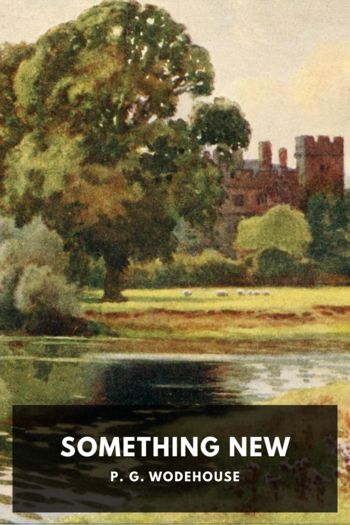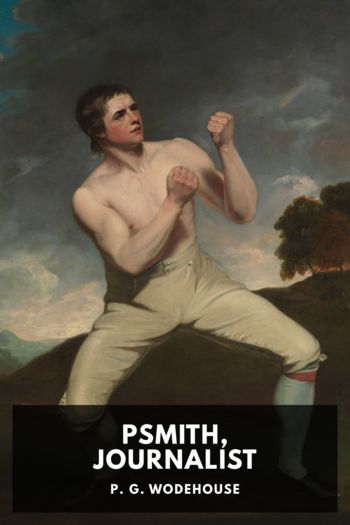Leave It to Psmith by P. G. Wodehouse (best ereader for academics TXT) 📕

- Author: P. G. Wodehouse
Book online «Leave It to Psmith by P. G. Wodehouse (best ereader for academics TXT) 📕». Author P. G. Wodehouse
“You had better go down and meet her, my dear fellow,” said Lord Emsworth. “At the station, you know,” he continued, clarifying his meaning. “She will be glad to see you.”
“I was about to suggest it myself,” said Psmith.
“Though why the library needs cataloguing,” said his lordship, returning to a problem which still vexed his soul when he had leisure to give a thought to it, “I can’t … However …”
He finished his coffee and rose from the table. A stray shaft of sunlight had fallen provocatively on his bald head, and sunshine always made him restive.
“Are you going to your flowers, Lord Emsworth?” asked Miss Peavey.
“Eh? What? Yes. Oh, yes. Going to have a look at those lobelias.”
“I will accompany you, if I may,” said Psmith.
“Eh? Why, certainly, certainly.”
“I have always held,” said Psmith, “that there is no finer tonic than a good look at a lobelia immediately after breakfast. Doctors, I believe, recommend it.”
“Oh, I say,” said Freddie hastily, as he reached the door, “can I have a couple of words with you a bit later on?”
“A thousand if you wish it,” said Psmith. “You will find me somewhere out there in the great open spaces where men are men.”
He included the entire company in a benevolent smile, and left the room.
“How charming he is!” sighed Miss Peavey. “Don’t you think so, Mr. Baxter?”
The Efficient Baxter seemed for a moment to find some difficulty in replying.
“Oh, very,” he said, but not heartily.
“And such a soul! It shines on that wonderful brow of his, doesn’t it?”
“He has a good forehead,” said Lady Constance. “But I wish he wouldn’t wear his hair so short. Somehow it makes him seem unlike a poet.”
Freddie, alarmed, swallowed a mouthful of scrambled egg.
“Oh, he’s a poet all right,” he said hastily.
“Well, really, Freddie,” said Lady Constance, piqued, “I think we hardly need you to tell us that.”
“No, no, of course. But what I mean is, in spite of his wearing his hair short, you know.”
“I ventured to speak to him of that yesterday,” said Miss Peavey, “and he said he rather expected to be wearing it even shorter very soon.”
“Freddie!” cried Lady Constance with asperity. “What are you doing?”
A brown lake of tea was filling the portion of the tablecloth immediately opposite the Hon. Frederick Threepwood. Like the Efficient Baxter a few minutes before, sudden emotion had caused him to upset his cup.
IIThe scrutiny of his lordship’s lobelias had palled upon Psmith at a fairly early stage in the proceedings, and he was sitting on the terrace wall enjoying a meditative cigarette when Freddie found him.
“Ah, Comrade Threepwood,” said Psmith, “welcome to Blandings Castle! You said something about wishing to have speech with me, if I remember rightly?”
The Hon. Freddie shot a nervous glance about him, and seated himself on the wall.
“I say,” he said, “I wish you wouldn’t say things like that.”
“Like what, Comrade Threepwood?”
“What you said to the Peavey woman.”
“I recollect having a refreshing chat with Miss Peavey yesterday afternoon,” said Psmith, “but I cannot recall saying anything calculated to bring the blush of shame to the cheek of modesty. What observation of mine was it that meets with your censure?”
“Why, that stuff about expecting to wear your hair shorter. If you’re going to go about saying that sort of thing—well, dash it, you might just as well give the whole bally show away at once and have done with it.”
Psmith nodded gravely.
“Your generous heat, Comrade Threepwood, is not unjustified. It was undoubtedly an error of judgment. If I have a fault—which I am not prepared to admit—it is a perhaps ungentlemanly desire to pull that curious female’s leg. A stronger man than myself might well find it hard to battle against the temptation. However, now that you have called it to my notice, it shall not occur again. In future I will moderate the persiflage. Cheer up, therefore, Comrade Threepwood, and let us see that merry smile of yours, of which I hear such good reports.”
The appeal failed to alleviate Freddie’s gloom. He smote morosely at a fly which had settled on his furrowed brow.
“I’m getting as jumpy as a cat,” he said.
“Fight against this unmanly weakness,” urged Psmith. “As far as I can see, everything is going along nicely.”
“I’m not so sure. I believe that blighter Baxter suspects something.”
“What do you think he suspects?”
“Why, that there’s something fishy about you.”
Psmith winced.
“I would be infinitely obliged to you, Comrade Threepwood, if you would not use that particular adjective. It awakens old memories, all very painful. But let us go more deeply into this matter, for you interest me strangely. Why do you think that cheery old Baxter, a delightful personality if ever I met one, suspects me?”
“It’s the way he looks at you.”
“I know what you mean, but I attribute no importance to it. As far as I have been able to ascertain during my brief visit, he looks at everybody and everything in precisely the same way. Only last night at dinner I observed him glaring with keen mistrust at about as blameless and innocent a plate of clear soup as was ever dished up. He then proceeded to shovel it down with quite undisguised relish. So possibly you are all wrong about his motive for looking at me like that. It may be admiration.”
“Well, I don’t like it.”
“Nor, from an aesthetic point of view, do I. But we must bear these things manfully. We must remind ourselves that it is Baxter’s misfortune rather than his fault that he looks like a dyspeptic lizard.”
Freddie was not to be consoled. His gloom deepened.
“And it isn’t only Baxter.”
“What else is on your mind?”
“The whole atmosphere of the place is getting rummy, if you know what I mean.” He bent towards Psmith and whispered pallidly. “I say, I believe that new housemaid is a detective!”
Psmith eyed him patiently.
“Which new housemaid, Comrade Threepwood? Brooding, as I do, pretty tensely all the time





Comments (0)